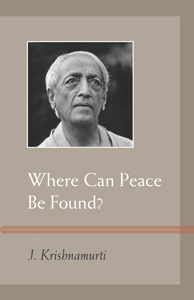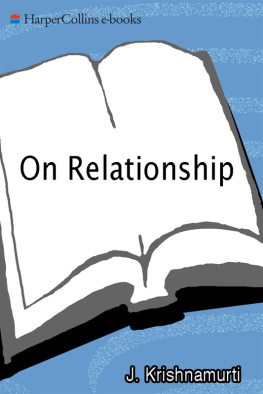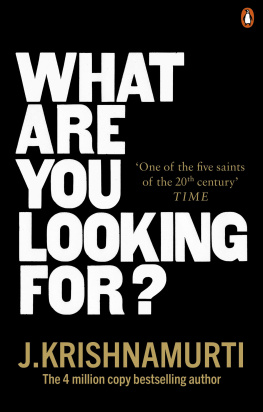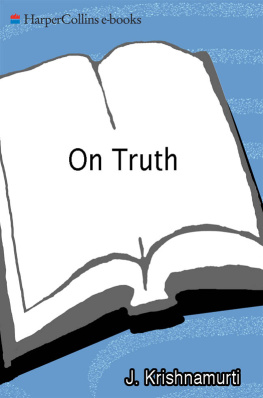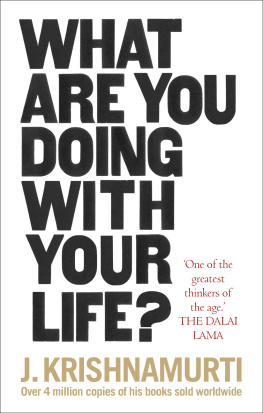Krishnamurti - Questions and Answers
Here you can read online Krishnamurti - Questions and Answers full text of the book (entire story) in english for free. Download pdf and epub, get meaning, cover and reviews about this ebook. publisher: Krishnamurti Foundation Trust, genre: Religion. Description of the work, (preface) as well as reviews are available. Best literature library LitArk.com created for fans of good reading and offers a wide selection of genres:
Romance novel
Science fiction
Adventure
Detective
Science
History
Home and family
Prose
Art
Politics
Computer
Non-fiction
Religion
Business
Children
Humor
Choose a favorite category and find really read worthwhile books. Enjoy immersion in the world of imagination, feel the emotions of the characters or learn something new for yourself, make an fascinating discovery.

- Book:Questions and Answers
- Author:
- Publisher:Krishnamurti Foundation Trust
- Genre:
- Rating:5 / 5
- Favourites:Add to favourites
- Your mark:
- 100
- 1
- 2
- 3
- 4
- 5
Questions and Answers: summary, description and annotation
We offer to read an annotation, description, summary or preface (depends on what the author of the book "Questions and Answers" wrote himself). If you haven't found the necessary information about the book — write in the comments, we will try to find it.
Questions and Answers — read online for free the complete book (whole text) full work
Below is the text of the book, divided by pages. System saving the place of the last page read, allows you to conveniently read the book "Questions and Answers" online for free, without having to search again every time where you left off. Put a bookmark, and you can go to the page where you finished reading at any time.
Font size:
Interval:
Bookmark:
Questions and Answers
Copyright 1982 Krishnamurti Foundation Trust Ltd.
QUESTIONS AND ANSWERS
BY
J. KRISHNAMURTI
INDEX
Brockwood Park, Hampshire, England. August, 1979.
Ojai, California. May, 1980.
Saanen, Switzerland. July, 1980.
Brockwood Park, Hampshire, England. September, 1980.
QUESTIONS AND ANSWERS
At the beginning of a question and answer meeting at Brockwood Park Krishnamurti said:
To quest is to seek. Together we are going to seek, find, discover the right answer. This is not the Delphic Oracle! Together we are going to find out the meaning and significance of the question and also seek the answer. There is no authority here. I happen to sit on a platform for convenience so that everybody can see, but that little height does not give me any authority whatsoever.
THE SELF
Question: Is it possible ever to be free of self-centred activity? Is there a real self apart from the self-created image?
What do we mean by the self? If you ask somebody what the self is, he would say, It is all my senses, my feelings, my imagination, my romantic demands, my possessions, a husband, a wife, my qualities, my struggles, my achievements, my ambitions, my aspirations, my unhappiness, my joysall that would be the self. You can add more words but the essence of it is the centre, the me, my impulsesI am impelled to go to India to find truth and so on. From this centre all action takes place: all our aspirations, our ambitions, our quarrels, our disagreements, our opinions, judgements, experiences, are centred in this. This centre is not only the conscious self acting outwardly but also the deep inner consciousness which is not open and obvious; it is all the different levels of consciousness.
Now the questioner asks: Is it possible to be free of this centre? Why does one want to be free of it? Is it because the centre is the cause of division? That is, the me is the active element that is operating all the time; it is the same me with different names, with a different coloured skin, with a different job, with a different position in the hierarchical social structureyou are Lord so-and-so, somebody else is a servantit is the same me dividing itself into all these different categoriessocially, economically and religiously.
Where there is this division there must be conflictthe Hindu as opposed to the Muslim, the Jew, the Arab, the American, the English, the French. That is physically obvious and it has brought about tremendous wars, great agony, brutality and violence. The self identifies with an idealnoble or ignobleand fights for that ideal. But it is still the ego trip. People go to India trying to find spirituality; they put on different fancy dress but they have only changed the garb, the clothes; essentially they are each the me operating, all the time struggling, endeavouring, grasping, denying, being deeply attached to their experiences, ideas, opinions and longings. And as one lives one observes that this centre, this me, is the essence of all trouble. Also one observes that it is the essence of all pleasure, fear and sorrow. So one asks, How am I to get rid of this centre so as to be really freeabsolutely, not relatively? It is fairly simple to be relatively free; one can be a little unselfish, a little concerned with social welfare, with the difficulties of others, but the centre is always there biting hard, brutal.
Is it possible to be absolutely free of that centre? First of all see that the greater the effort that is made to be free of the centre, the more that very effort strengthens the centre, the self. For those who go off into meditation of various kinds, trying to impose something upon themselves, the me that identifies with that effort is captured by that and says: I have achieved, but that me is still the centre.
To be free there must be no effort; which does not mean doing what one likes, for that is still the movement of the self.
So what is one to do? If you are not to make an effort, because you see the truth that the more effort you make the greater the travail of the centre, then what is one to do?
The questioner asks: Is there a real self apart from the self created by thought with its images? Many people ask that. The Hindus have said that there is a highest principle which is the self. We imagine also that there is a real self apart from the me. You all, I am sure, feel there is something else beyond this me, which has been called the higher self, the sublime or the supreme self. The moment we use the word self, or use any word to describe that which is beyond the self, the me, it is still the self.
Is it possible to be free of the self?without becoming a vegetable, without becoming absent-minded, somewhat mad? Which means: is it possible to be totally free from attachment?which is one of the attributes, one of the qualities, of the self. One is attached to ones reputation, to ones name, to ones experiences. One is attached to what one has said. If you really want to be free of the self it means no attachment; which does not mean you become detached, indifferent, callous, shut yourself away, which is another activity of the self. Before, it was attached; now it says, I wont be attached. That is still the movement of the self.
When you are really, without effort, deeply, basically, not attached, then from that deep sense of no attachment comes responsibility. Not responsibility to your wife, to your children, but the deep sense of responsibility. Will you do it? That is the question. We can talk everlastingly, put it into different words, but when it comes to testing it, acting, we do not seem to want to do it; we prefer to go on as we are, with the status quo slightly modified but carrying on with our quarrels.
To be free from your own experience, from your own knowledge, from your own accumulated perceptionit is possible if you go at it. And it does not take time. That is one of our excuses: we must have time to be free. When you see that one of the major factors of the self is attachment and you see what it does in the world, and what it does in your relationship with another, quarrels, separation, all the ugliness of relationshipif you see the truth of attachment, then you are free from it. Your own perception sets you free. Will you do it?
SECURITY
Question: Can there be absolute security for man in this life?
This is a very serious question; we all want security, both physical and principally, psychological. If we were psychologically secure, certain, then we might not be so concerned with physical security. The search for psychological security is preventing physical security.
The questioner asks: Is there absolute security for us human beings? We must have securitylike a child clinging to its mother; if the mother and the father do not pay enough attention to the baby, do not give it affection and care, then the brain and nerves of the baby are affected. The child must have physical security. Now, why do we demand psychological security? There is the psyche, demanding security; but is there psychological security at all? We want security in our relationshipsmy wife, my children, the family unit. In that attachment we think there is a certain security, but when we find that there is no security there we soon break away and try to find it elsewhere.
We try to find security in a group, in the tribethat glorified tribe that is the nation. And yet that nation is against another nation. Thinking that security, psychologically, is in a person, in a country, in a belief, in your own experience, is the same as demanding physical security. In demanding psychological security we have divided ourselves: the Hindu, the Muslim, the Jew, the Arab, the believer in Jesus, the believer in something elsein all of them there is the demand for security. Psychological security has been sought in these illusions; the various illusions of being secure in Catholicism, in Buddhism, in Hinduism, in Judaism, Islam and so on which have created nothing but illusory securities because they are all fighting each other. The moment you see this you do not belong to anything. When you see the truth that the mind, or thought, has sought security in illusions, that very perception brings intelligence.
Next pageFont size:
Interval:
Bookmark:
Similar books «Questions and Answers»
Look at similar books to Questions and Answers. We have selected literature similar in name and meaning in the hope of providing readers with more options to find new, interesting, not yet read works.
Discussion, reviews of the book Questions and Answers and just readers' own opinions. Leave your comments, write what you think about the work, its meaning or the main characters. Specify what exactly you liked and what you didn't like, and why you think so.





